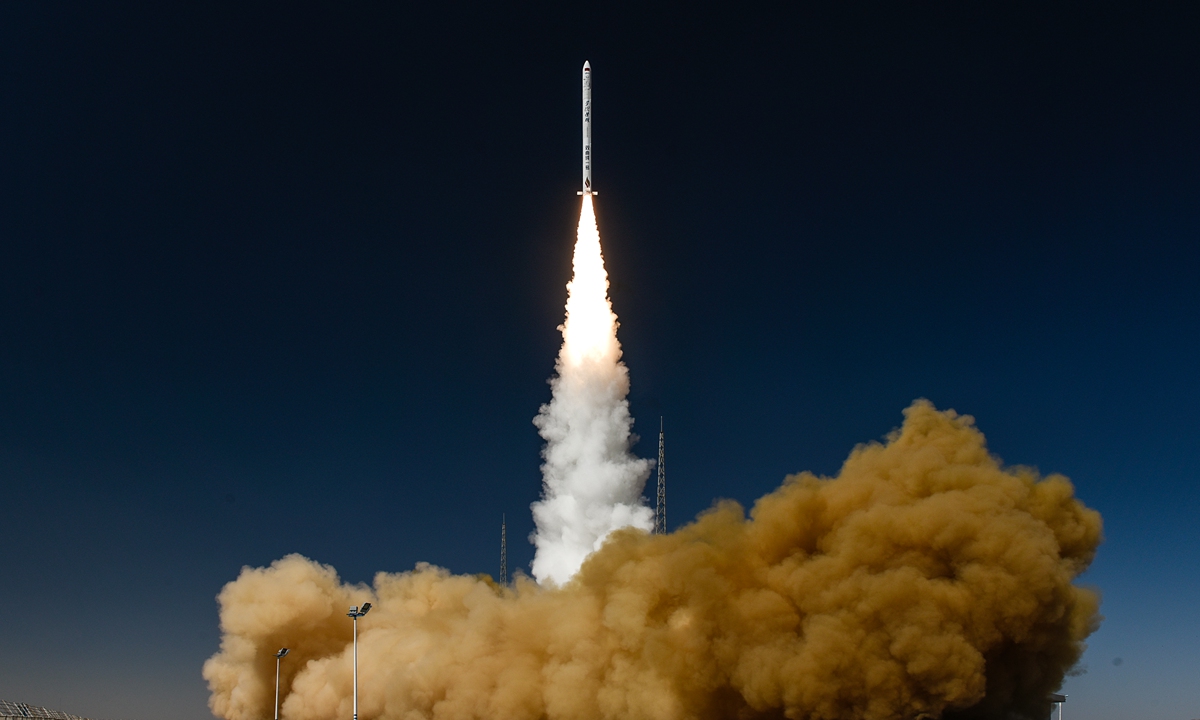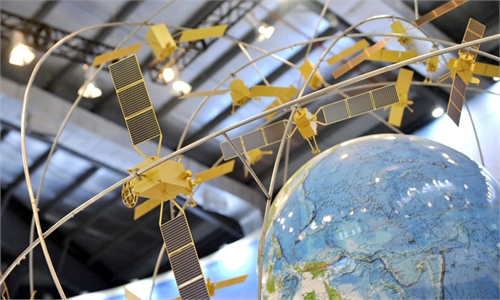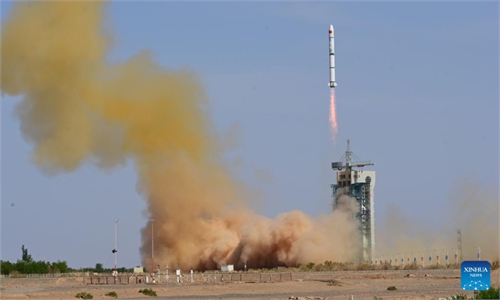Chinese commercial space firms plan more launches in Q3 as global competition over LEO satellites intensifies

Beijing Interstellar Glory Space Technology Co launches its Hyperbola I commercial carrier rocket from Jiuquan, Northwest China's Gansu Province, on April 7, 2023. Photo: VCG
A number of Chinese commercial space companies are mulling over plans for new launch dates in the third quarter this year, the Global Times learned from industry insiders, as domestic players step up their efforts to optimize design and reduce cost for satellites production.
As global competition over low-earth-orbit (LEO) satellites growing white-hot after SpaceX builds the satellite-based Starlink constellation internet connection, it is of vital importance for Chinese companies to send more LEO satellites into space to catch up in the race for LEO telecom frequency and orbital resources.
It is hoped that with more policy support and under the new "whole-of-nation" system in space explorations, Chinese firms will have the chance to run "neck and neck" with global enterprises in providing low-cost broadband connectivity to smartphone terminals on the ground, industry insiders said.
The planned inaugural launches of Chinese private space firms, scheduled in the third quarter, will be equipped with more advanced payload technology and other innovations to reduce cost while improving efficiency, the Global Times learned.
China's commercial space industry has entered its fast-lane development in recent years, with an estimated compound annual growth rate of more than 20 percent during the past five years, industry observers said. The burgeoning market comes as China's space sector has entered a new phase of rapid development, in which both state-owned and private companies are important players.
Crowded LEO field
"The era for mass space infrastructure construction has arrived, and LEO is set to become more crowded with satellites, and competition [between major global powers] will grow more intense," an industry insider who preferred not to be identified, told the Global Times, while highlighting more launches by Chinese companies.
Beijing-based Chinese commercial space start-up Galaxy Space successfully launched six experimental satellites in March 2022, which - added to a satellite already running onto the orbit - constitute China's first LEO satellite-based broadband connectivity constellation.
The company said it will launch a flat-panel stackable satellite, to test the performance of its latest generation of satellites, at an appropriate time in 2023.
In April 2021, the China Satellite Network Group Co was approved to be set up in Xiong'an New Area, in North China's Hebei Province. It is the first centrally-administrated state-owned enterprise (SOE) to be set up in the new area dubbed as China's "city of future," and the only SOE in the business of satellite-based internet network construction.
Industry insiders pointed out that the forerunner of the commercial space industry is US-based SpaceX, founded by Elon Musk, which currently has more than 4,000 Starlink satellites orbiting in space. In February, SpaceX President Gwynne Shotwell said the company's satellite-based internet service recorded its first quarter of positive cash flow in 2022 and is on track to turn profitable this year.
US-based provider of high-speed satellite broadband services Viasat said in a statement sent to the Global Times that the company aims to build ViaSat-3, a constellation of three ultra-high-capacity Ka-band geostationary satellites. The Ka-band consists of frequencies at the top of the commercially available frequency spectrum. The first ViaSat-3 Americas was successful launched on April 30, and will be in service in the middle of 2023.
In March, London-based OneWeb launched the final set of satellites it needed to deliver a broadband internet connection. The European Parliament and the EU member states also approved a plan in February to build the bloc's satellite communications internet system IRIS2 by 2027.
"China has a well-established ground industrial system that can empower "satellite industrialization" and lay the foundation for the construction of a constellation of satellite internet, but there is a gap between Chinese private firms and SpaceX in terms of satellite network filings and network operation qualification," an industry insider told the Global Times. He also took note of the cost-effective advantage of US-made commercial rockets, adding Chinese peers "need a lot of effort to catch up."
Satellite industrialization
According to data released by the NewSpace Index, there are 321 commercial satellite constellations being planned as of January 2023, with about 50 percent having already sent into space, while the other majority was at a stage of fundraising and development.
Industry insiders believe that under the new "whole-of-nation" system, the participation of more commercial space firms will inject new vigor into Chinese production. "Chinese private space firms are more market-oriented. During the procurement process, we purchased parts from both state-owned institutes as well as private companies," the insider said.
China's aerospace industry was opened to the private sectors in around 2015 and 2016. In April 2020, China's National Development and Reform Commission (NDRC), the country's top economic planner, included satellite-based internet into China's new basic infrastructure system. In January 2022, the State Council, China's cabinet, released a digital economy development plan for the 14th Five-year Period (2021-25), which clearly called for the accelerated development of China's satellite-based communication network.
Viasat said that the company has formed partnership with China Satellite Communication Co, and it expects to see a lot of new applications on board in China as more flights start to offer in-flight connectivity services.
It is expected that with the build-up of more satellite-based constellation, the globe will enter an area of unparalleled connectivity with internet connecting air, sky, land and sea, signaling the dawn of the intelligent era, analysts said.
According to a report issued by the Euroconsult in January, the value of space economy reached $464 billion in 2022. The space consulting firm estimated that the market would reach $737 billion within a decade.



